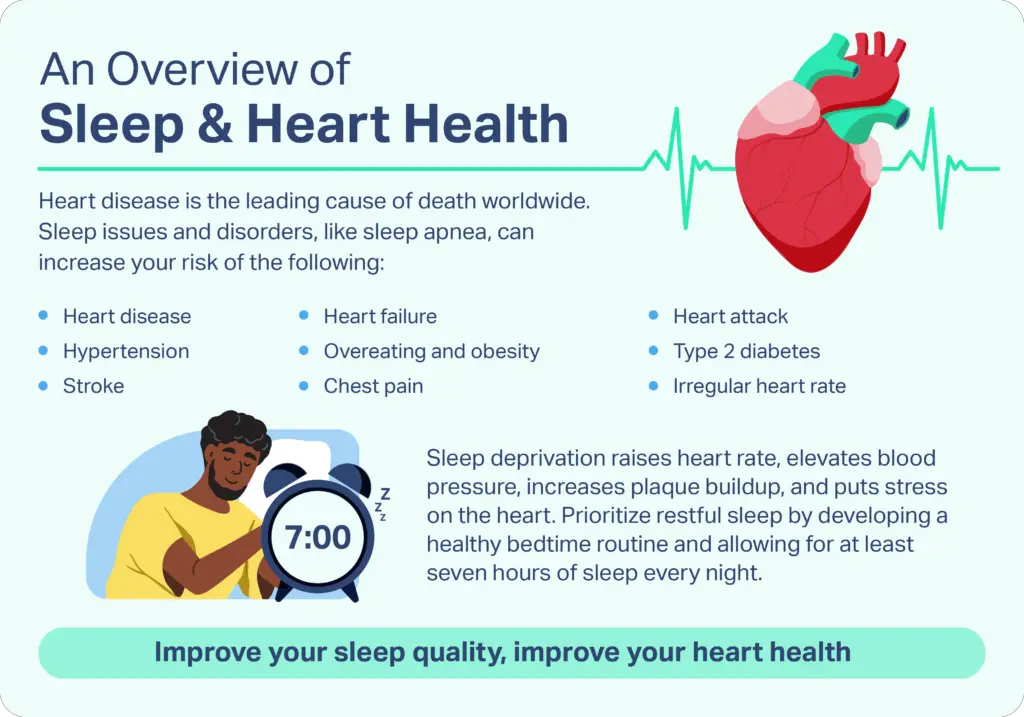Falling asleep at specific hours can reduce the risk of heart disease, regardless of age, weight, exercise habits, or smoking. Lack of sleep increases the risk for heart disease and heart attacks.
Without enough sleep, the risk for heart disease and heart attack goes up.

Credit: www.healthline.com
The Link Between Sleep And Heart Disease
Falling asleep at specific hours may lower your risk of heart disease, regardless of your age, weight, or exercise habits. Prioritizing a good night’s sleep can have a positive impact on your heart health.
The Impact Of Sleep On Heart Health
Getting a good night’s sleep is not only crucial for feeling refreshed and energized the next day, but it also plays a significant role in maintaining a healthy heart. Research has shown a strong link between sleep and heart disease, highlighting the importance of quality sleep for overall cardiovascular health.The Role Of Sleep Duration In Cardiovascular Disease
The duration of your sleep also plays a vital role in preventing cardiovascular disease. Studies have found that individuals who consistently sleep either too little or too much are at a higher risk of developing heart problems. It is recommended that adults aim for an average of seven to eight hours of sleep per night to maintain optimal heart health.The Association Between Poor Sleep And Heart Problems
Poor sleep quality is associated with an increased risk of various heart problems. Individuals who experience difficulties falling asleep, staying asleep, or waking up too early may be at a higher risk of developing hypertension, heart attacks, and strokes. It is crucial to address any sleep issues and work towards improving sleep quality to reduce the risk of heart disease. Maintaining a healthy sleep routine is an essential aspect of overall cardiovascular health. By understanding the impact of sleep on heart health, recognizing the role of sleep duration in cardiovascular disease, and addressing poor sleep quality, individuals can take proactive steps towards reducing their risk of heart problems. Taking care of your sleep can significantly contribute to a healthier heart and a healthier life overall. So make sleep a priority and reap the benefits of a well-rested heart.
Credit: www.healthline.com
Optimal Bedtime For Heart Health
Falling asleep at specific hours can lower your risk of heart disease, according to studies. Discover the optimal bedtime for heart health.
The Best Time To Fall Asleep For A Healthy Heart
Getting enough sleep is crucial for maintaining a healthy heart. But did you know that the time you go to bed can also have an impact on your heart health? Studies have shown that falling asleep at certain hours can reduce the risk of heart disease. So, what is the optimal bedtime for a healthy heart?
Bedtime Recommendations From Experts
Experts recommend falling asleep between 10:00 PM and 11:00 PM for optimal heart health. This is because during these hours, the body goes through a natural repair and regeneration process, which helps to keep the heart and other organs healthy. Going to bed early and waking up early also aligns with the body’s natural sleep-wake cycle, known as the circadian rhythm.
To further improve sleep quality and promote heart health, here are some bedtime recommendations from experts:
- Establish a consistent sleep schedule: Try to go to bed and wake up at the same time every day, including weekends.
- Create a relaxing bedtime routine: Engage in activities that help you wind down, such as reading a book, taking a warm bath, or practicing relaxation techniques.
- Create a sleep-friendly environment: Make sure your bedroom is cool, dark, and quiet. Use earplugs, eye masks, or white noise machines if needed.
- Avoid electronics before bed: The blue light emitted by electronic devices can interfere with the body’s production of melatonin, a hormone that regulates sleep.
- Avoid heavy meals and caffeine close to bedtime: Eating a large meal or consuming caffeine late in the evening can disrupt sleep and make it harder for the body to relax.
Addressing Poor Sleep For Heart Health
If you’re struggling with poor sleep, it’s important to address the issue for the sake of your heart health. Chronic sleep deprivation and poor sleep quality have been linked to an increased risk of heart disease, high blood pressure, and other cardiovascular problems.
To improve sleep and reduce the risk of heart disease, consider adopting the following habits:
- Stick to a regular sleep schedule
- Create a soothing bedtime routine
- Avoid stimulating activities and electronics before bed
- Make your bedroom a comfortable sleep environment
- Manage stress through relaxation techniques
By prioritizing optimal sleep and making necessary lifestyle adjustments, you can reduce your risk of heart disease and enhance your overall well-being. Remember, a good night’s sleep is not just a luxury; it’s an essential component of a healthy heart.
Managing Sleep To Reduce Heart Disease Risk
Reduce your risk of heart disease by falling asleep at specific hours. Adequate sleep can be crucial in preventing cardiovascular diseases, regardless of age, weight, or lifestyle factors.
Tips For Improving Sleep Quality And Duration
Sleep plays a crucial role in maintaining our overall health and well-being. In fact, managing your sleep can have a significant impact on reducing your risk of heart disease. If you’re looking to improve your sleep quality and duration, here are some tips to consider:
- Create a relaxing bedtime routine: Establishing a consistent routine before bed can signal to your body that it’s time to wind down and prepare for sleep. This may include activities such as reading a book, taking a warm bath, or practicing relaxation techniques like deep breathing.
- Avoid electronic devices before bed: The blue light emitted by electronic devices can disrupt your body’s natural sleep-wake cycle. To promote better sleep, try to limit your exposure to screens at least one hour before bedtime.
- Keep your bedroom conducive to sleep: Create an environment that promotes restful sleep. This means keeping the room cool, dark, and quiet. Consider using earplugs, an eye mask, or a white noise machine if necessary.
- Stick to a consistent sleep schedule: Going to bed and waking up at the same time every day, even on weekends, can help regulate your body’s sleep-wake cycle. This consistency can improve both the quality and duration of your sleep.
- Avoid caffeine and heavy meals before bed: Consuming caffeine and large meals close to bedtime can interfere with your ability to fall asleep and stay asleep. Limit your intake of caffeinated beverages and avoid heavy, rich foods in the evening.
The Connection Between Sleep Deprivation And Heart Problems
Research has shown a strong link between sleep deprivation and an increased risk of heart problems. When you consistently fail to get enough sleep, your body experiences various physiological changes that can negatively impact your cardiovascular health. Some of these changes include:
- Elevated blood pressure: Lack of sleep can lead to higher blood pressure levels, which puts added strain on your heart and increases your risk of developing heart disease.
- Imbalanced hormones: Sleep deprivation disrupts the production and regulation of hormones in the body, including those that control appetite, metabolism, and stress. These hormonal imbalances can contribute to conditions like obesity and diabetes, both of which are risk factors for heart disease.
- Inflammation and oxidative stress: Chronic sleep deprivation triggers inflammation and oxidative stress in the body, which can damage blood vessels and promote the development of atherosclerosis.
It’s clear that sleep deprivation can have detrimental effects on your heart health. By prioritizing adequate sleep, you can take a proactive step in reducing your risk of heart disease.
Sleeping Habits And Heart Disease Prevention
Developing healthy sleeping habits is crucial for preventing heart disease. Here are some habits you can cultivate to protect your heart:
- Aim for 7-9 hours of sleep per night: Most adults require between 7 and 9 hours of quality sleep to support optimal health. Make it a priority to allocate enough time for sleep each night.
- Engage in regular physical activity: Being physically active during the day can promote better sleep at night. Aim for at least 30 minutes of moderate exercise most days of the week.
- Manage stress effectively: Chronic stress can disrupt your sleep patterns and increase your risk of heart disease. Find healthy ways to manage stress, such as practicing mindfulness, engaging in hobbies, or seeking support from loved ones.
- Avoid sleep disorders: If you suspect you have a sleep disorder, such as sleep apnea or insomnia, it’s important to seek medical attention. Treating these conditions can significantly improve your sleep quality and reduce the risk of associated heart problems.
By implementing these sleeping habits into your daily routine, you’ll be taking proactive steps towards preventing heart disease and promoting overall cardiovascular health.

Credit: www.cdc.gov
Frequently Asked Questions On Falling Asleep At These Hours May Reduce Your Risk Of Heart Disease
Does Sleep Reduce Heart Disease?
Getting enough sleep is crucial for reducing the risk of heart disease and heart attack, regardless of age, weight, exercise, or smoking habits. Lack of sleep is linked to high blood pressure and unhealthy habits that can harm the heart.
Maintain a consistent and adequate sleep duration to protect your heart health.
What Is The 7 Second Trick To Prevent Heart Attack?
Falling asleep at the right time can reduce your risk of heart attack. Take a deep breath, hold it, and bear down as if you’re having a bowel movement. Then release the breath and relax. This trick can help prevent heart disease.
Does Your Bedtime Affect Your Heart Health?
Falling asleep at the right time can reduce your risk of heart disease. Adequate sleep is important for preventing cardiovascular diseases. Poor sleep can lead to high blood pressure and unhealthy habits that harm your heart. Get enough sleep to protect your heart health.
Does Sleeping Less Than 7 8 Hours At Night Have A Greater Risk Of Heart Disease And Stroke?
Sleeping less than 7-8 hours at night increases the risk of heart disease and stroke. Adequate sleep duration is important for preventing cardiovascular diseases. Insomnia and poor sleep habits are linked to high blood pressure and heart disease. Getting enough sleep is crucial for maintaining heart health.
Conclusion
Getting enough sleep is crucial for maintaining a healthy heart. Research shows that falling asleep at the right hours can actually reduce your risk of heart disease. By prioritizing a good night’s rest and sticking to a consistent bedtime, you can greatly improve your cardiovascular health.
So, make sure to prioritize sleep and give your heart the rest it needs to stay strong and healthy.
